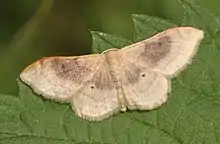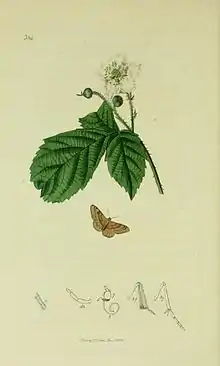Idaea degeneraria
Idaea degeneraria, the Portland ribbon wave, is a moth of the family Geometridae. The species was first described by Jacob Hübner in 1799.[1][2]
| Portland ribbon wave | |
|---|---|
 | |
| Dorsal view | |
| Scientific classification | |
| Kingdom: | Animalia |
| Phylum: | Arthropoda |
| Class: | Insecta |
| Order: | Lepidoptera |
| Family: | Geometridae |
| Genus: | Idaea |
| Species: | I. degeneraria |
| Binomial name | |
| Idaea degeneraria (Hübner, 1799) | |
Subspecies
- Idaea degeneraria alticolaria (Schawerda, 1933)
- Idaea degeneraria degeneraria (Hubner, 1800)
- Idaea degeneraria erschoffi (Christoph, 1872)
Description

Illustration from John Curtis's British Entomology Volume 6
The species has a wingspan of 26–31 mm. These small pale brown geometers are darker brown-marked between antemedian and median lines.
Biology
The larvae feed on various low herbaceous plants, mainly dandelion (Taraxacum species) and knotgrass (Polygonum species). The adults fly in one generation from June to July.
Distribution
This species can be found in most of Europe, in the Near East and in North Africa.[1][4] These moths prefer warm limestone undercliffs.[5]
Notes
- ^ The flight season refers to the British Isles. This may vary in other parts of its range.
References
This article is issued from Wikipedia. The text is licensed under Creative Commons - Attribution - Sharealike. Additional terms may apply for the media files.